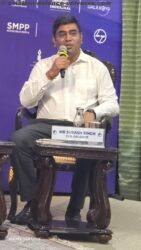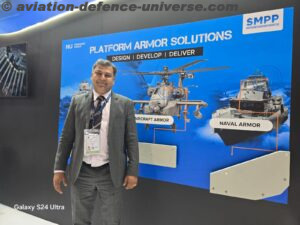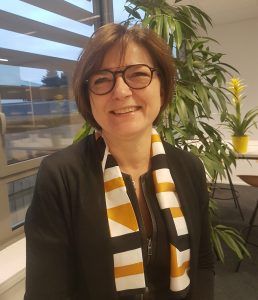
Paris. 27 April 2020. As the Covid-19 pandemic continues to spread, Thales employees are fully mobilised in the battle to overcome the virus and deal with its consequences. Sophie Le Pennec, VP, Occupational Health, Safety and Environment for the Group, tells us what Thales is doing as a company and how individual employees are showing their solidarity by lending technical expertise and innovative ideas.
Q. The Thales Group has launched various initiatives to fight Covid-19 and the spread of the disease. Can you tell us briefly why?
A. Our main objective from the outset has obviously been to put everything in place to ensure our employees are safe and to incorporate the appropriate health protection rules. Our employees’ health is top priority and we have taken a number of steps to keep them out of harm’s way. Please allow me to pay particular tribute to the professionalism and commitment of the Health, Safety and Environment and occupational medicine teams who are sparing no effort during this particular period. The Group has also set up several psychological support services and a resource centre for all its employees in France to help them cope with this absolutely unprecedented situation. Finally, We have also tried to show our customers, partners and the healthcare community around us that we are by their side in this crisis and that each day our technology and technical expertise is available to help them get through this difficult period.
Q. You mentioned helping health workers. Has Thales donated masks, for example, to hospitals where they’re really needed?
A. Yes, we have donated about 20,000 FFP2 masks to hospitals and health workers, in addition to the 260,000 masks provided to the French government. Thales facilities, throughout France and beyond, are also assisting with distribution of disposable gowns to help local healthcare professionals in need. But we’re doing more than that. We’re also trying to make sure medical teams can benefit from our other capabilities.
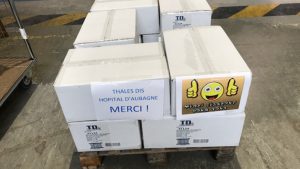
Q. How else is Thales helping healthcare professionals and hospitals?
A. Following the example of Thales employees in China, who donated protective clothing to Wuhan hospitals at the beginning of the year, staff at our Hengelo site in the Netherlands collected and donated masks, disposable coveralls and shoe protectors to local GPs. Also in the Netherlands, staff from Huizen have donated tablet computers to the Meander medical centre in Amersfoort so that patients can stay in touch with family and friends. We are also working with Airbus and 20 other companies to produce ventilators in the United Kingdom. For that project, Thales is providing the consortium with expertise in training and simulation of complex systems.
At the same time, we are working with hospitals as they race to increase capacity and equipment availability. To meet their increased needs for high-resolution radiology, which is particularly useful for screening patients, monitoring them and analysing lesions and damage to the lungs, we have reorganised our organisation to maintain production. We were thus able, while ensuring the health security of our teams, to meet the demand of hospitals, which are fighting against the Covid epidemic. We are also working with the emergency services to help them cope with the exponential growth in emergency calls from the general public.
Q. What are you doing to help Thales customers?
A. We have doing various things to help our customers and partners to continue to operate, particular in areas of crucial importance to society such as security, transport and telecommunications.
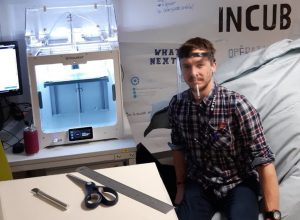
Q. What about cybersecurity? For a society going through a digital transformation, cybersecurity was already seen as a major challenge — but it’s a huge concern at the moment with so many people working from home because of the lockdown.
A. With more people working from home, the number of cyberattacks has risen. For people with key roles in combatting this crisis, we are providing robust IT security solutions to protect their data, networks and communications. When we realised that groups of hackers were exploiting the Covid-19 crisis to launch cyberattacks, our analysts urgently produced a report calling attention to these threats and, in view of the exceptional circumstances, we immediately made their analysis available to everyone free of charge. More than 50 medical facilities in France immediately requested more information and now receive our regular newsfeeds free of charge with up-to-date information and analysis of the cyberthreat situation.
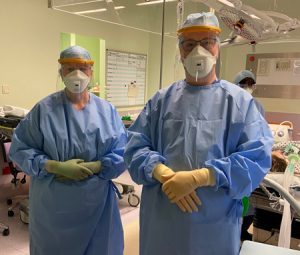
We have also released a free enterprise version of our secure messaging app, Citadel, which offers free access to the service for a whole organisation and its employees. Thales has also been offering 45 days of free access to Cryptobox, our secure collaborative workspace solution, which lets users set up virtual individual and group workspaces where they can securely share and store all the documents they need.
Q. What can you tell us about Thales initiatives in other areas?
A. Thales teams at the Châtellerault facility in France and elsewhere have mobilised to help France’s Civil Defence guarantee continuity of operations. They are providing maintenance, parts and support services for the agency’s helicopters to help keep them flying during this health crisis.
Thales is also helping the Netherlands police to keep information flowing smoothly between emergency rooms and crisis management centres. Data from all over the country is consolidated in a secure online system that these crisis management centres can access to evaluate the overall situation and make the best decisions as quickly as possible.
To raise public awareness in Latin America, operators are using our mobile marketing solutions to send out healthcare and other public service announcements to their subscribers on a massive scale, with the possibility of resending the messages automatically if they haven’t been read.
In Wales, Thales has joined the Tech Taskforce set up to support the Welsh economy by providing free business advice to companies. We’re leveraging the capabilities and skills that we have within the National Digital Exploitation Centre (NDEC) to provide cybersecurity but also technical and digital advice to ensure that local businesses are resilient during this difficult period and are in a position to bounce back rapidly.
Thales is working hard to ensure continuity of public transport so that people on the frontline of this crisis can get to work. Our contribution includes emergency maintenance, such as the recent operations in Cairo, Egypt, where floods impacted operation of the city’s metro lines.
Under a payroll giving scheme in France, all proceeds will be going to the Paris hospitals research foundation or the Covid-19 emergency assistance fund operated by the Secours Populaire charity to help the most vulnerable population groups. Similar initiatives are underway in China and India.
As well as these measures by the Group, Thales employees are also engaged individually and collectively in the fight against the pandemic. Can you give some examples of what they’re doing?
Alongside the action the Group is taking, we have seen a very high level of engagement on the part of our employees, with large numbers of spontaneous projects taking shape in the last few weeks all over the world. In Spain, for example, our people have been using their own 3D printers to produce face shields.
A face mask designed by a Thales employee for 3D printing and masks for frontline hospital staff under a nation-wide community engagement scheme. Similar efforts have been undertaken in France. The FabLabs network in the southwest has supplied 3,000 face shields in just the last few days to the university hospitals in Nîmes and Toulouse. Employees at Thonon, Moirans and Vélizy are coordinating the manufacture of medical face shields using 3D printing and helping to distribute them to healthcare facilities. Thales staff in Brest, Sophia-Antipolis, Aubagne and Bordeaux are also helping to make face shields for hospitals in their regions. In Singapore, employees have volunteered to sew reusable fabric masks for people in need, including children and foreign migrant workers.
Other employees are also taking part in “A Mask For All”, an international project by employees in Europe, Argentina and the United States that is drawing on their different areas of expertise and using 3D printing techniques to speed up mask production.
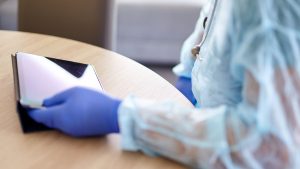
Q. A lot of these community engagement projects and other actions draw on Thales’s technical expertise. What about technological innovation?
A. In France, a call for projects has been launched by the Defence Innovation Agency (AID) for the ministry of defence to find innovative ways of fighting the Covid-19 pandemic — innovations that could be deployed quickly to protect the population, help get patients to hospital, provide testing solutions, monitor the disease and show how the pandemic is developing. Thales has submitted about a dozen technology-driven projects in various areas, including crisis management tools, patient admission support solutions to help hospital staff, rapid diagnosis techniques and teleworking tools. On a number of these projects, Thales is working in support of SMEs or start-ups. On others, we are working with partners in the healthcare community. In Montreal, Thales has submitted nine publicly funded projects developed with the government to provide innovative solutions to the most critical challenges. The key objectives of these projects are to help healthcare facilities increase their capacity and to provide decision support solutions to public authorities.
Q. Do you want to add anything that we haven’t covered in this interview?
A. I am extremely proud of everybody’s engagement, of this surge in solidarity by the Thales Group and its employees, and by their evident desire to help and protect others and share their expertise. It shows that a tech company is about much more than algorithms — it’s about men and women who are willing and able to rally their strengths for the benefit of society. This is a compelling force for Thales and it shows who we are really — a group of men and women using their skills and adapting their technologies to help other human beings. It’s a blessing for a company to be able to count on this level of spontaneity, humanity and resourcefulness, and I’m personally very proud to work with people like this. Thank you all for everything you are doing to fight Covid-19!
As released by Thales







































